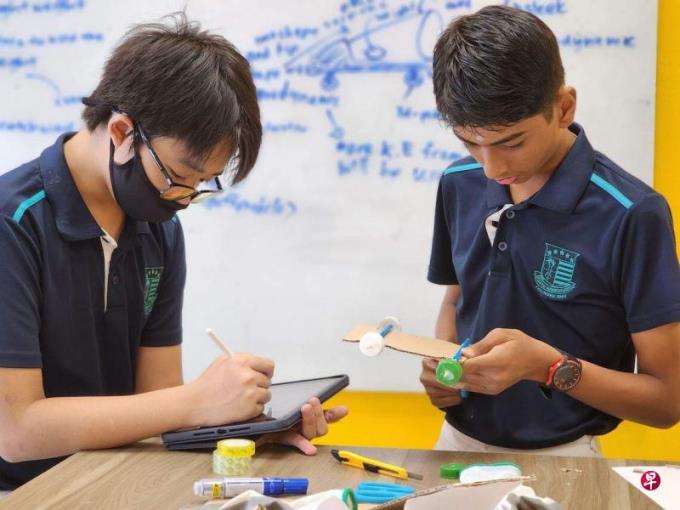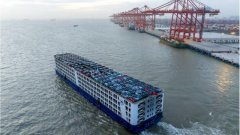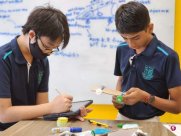
Jump out of the frame and think of creative thinking. From the classroom, workplace to the government's national governance, review various problems without falling around.The development of Singapore's country is becoming more and more complicated and precise, and the problems we face will become more and more unique. It is difficult to find an example of the reference in other places.
Programme for International Student Assessment (PISA) in the International Student Evaluation Project (OECD) of Economic Cooperation and Development (OECD), Singaporean students have performed well for many years and have attracted much attention for many years, which has attracted much attention from international concern.The signboard.
Following the top reading and mathematical test list, PISA announced on June 18th that in the 2022 creative thinking project, Singapore has achieved another world's first.
6606 15 -year -old students participated in the survey, from 149 middle schools and 15 private institutions. They are students who have received reading, mathematics and scientific testing in 2022.
In the evaluation of the Economic Organization every three years, the "Innovation" project will be added, including 64 education systems, and choose to participate in this round of creative thinking surveys.
Among the 20 best economies, Asia accounted for three, the other two were South Korea and 16th in Taipei.Other locations are occupied by Western countries, mainly developed countries.
The most amazing thing is that the United States, the United States, and China and Japan have not entered the top 20, Germany and Israel are only 17 and 20.The highest score of creative thinking projects is 60 points, and Singapore students score an average of 41, which is significantly better than the national average of 33 points.
The Ministry of Education of Singapore analyzed the performance of local students from the economic class. The minimum of 25 % of the students in the economic class also made good results and achieved 36 average scores.This is higher than the average of 28 points scored by the minimum of 25 % of the students in the economic class, and exceeds the overall an average of 33 points in the overall organization.
The highest 25 % of students in the economic class of Singapore scored 45 points (the country's average country is 38 points), which means that the highest and lowest local students in the economic class show the average nine -point gap, and the State Organization National StateThe gap between 10 points is similar.
This found that the height of the economic class does affect the creative thinking of students.This may reflect the difference in the starting point between them.
Overall, girls in various economies performed better than boys; Singapore girls and boys scored 42 points and 40 points respectively.In terms of Singapore, the factors that determine the height of creative thinking are not obvious.
Pisa's questionnaire survey also shows that 80%of local students believe that teachers value students' creativity, which is higher than the average level of OECD 70%.80%of local students believe that teachers encourage them to propose creative answers, which is 64%higher than the average level of OECD.81%of students said that they have the opportunity to express their personal ideas at school, which also exceeds the average level of OECD 69%.
Reading, mathematical ability, and creative thinking are related to further interpretation of experts.Singapore students are unplugged in these three international evaluations, which may show that there is a causal relationship between the three.
Internationally evaluating this creative thinking, how much to subvert the inherent impression of Singapore's education, students and parents; in the past, people thought that Singapore's parents were afraid of losing and students were afraid of failure. Schools also regarded academic grades as indicators to run schools.The so -called moisturizing is silent, and this world's first reminds us that the overall educational purpose and concept of Singapore has unknowingly changed.
The survey pointed out that 84%of students in Singapore said that family members encouraged them to try new things, which is slightly higher than the average level of OECD.This is also a surprising discovery.
The Deputy Chief of Education (Course) Sun Zhenwei pointed out that students hope that students will have a wider and more comprehensive development, not just spend too much time to cope with the schoolwork and improve their results.He said: "We should encourage students to try new things and different activities at school and home, so that they can have a wider experience and get more comprehensive development." His statement seems to confirm the government in the past few years, and began to implement the implementation and began to implement it.The educational concept of "academic performance is not everything".This international survey is at the same time, allowing Singapore to accept the results of the reform.
On the other hand, students have always attached great importance to students from elementary school as fun and creative thinking. Countries that do not give students test pressures such as Australia, New Zealand and Finland (ranked fourth and fifth in this survey, respectivelySeventh), in this regard, in front of Singapore, it seems to be caught up by Singapore.
Singapore's education adjustment direction, parents' mentality is slowly changing. Are these all true?The data was in front of the eyes, and people had to believe it.
Minister of Education Chen Zhensheng posted on Facebook: "We must continue to cultivate and affirm the creativity of students, including outside the school. Employers and communities can play a role to shape a culture, so that students and employees have confidence to establish confidence to buildOpinions can work more and achieve new possibilities.We cannot be intoxicated by ourselves because of this world.
Jump out of the box to think, let the creative thinking unrestrained, from the classroom, workplace to the government's national governance, and examine various issues without falling around.The development of Singapore's country is becoming more and more complicated and precise, and the problems we face will become more and more unique. It is difficult to find an example of the reference in other places.The unique environment requires unique thinking, and creative thinking determines Singapore's future success or failure.The future generation of rich creative thinking also brings new challenges to political leaders.




